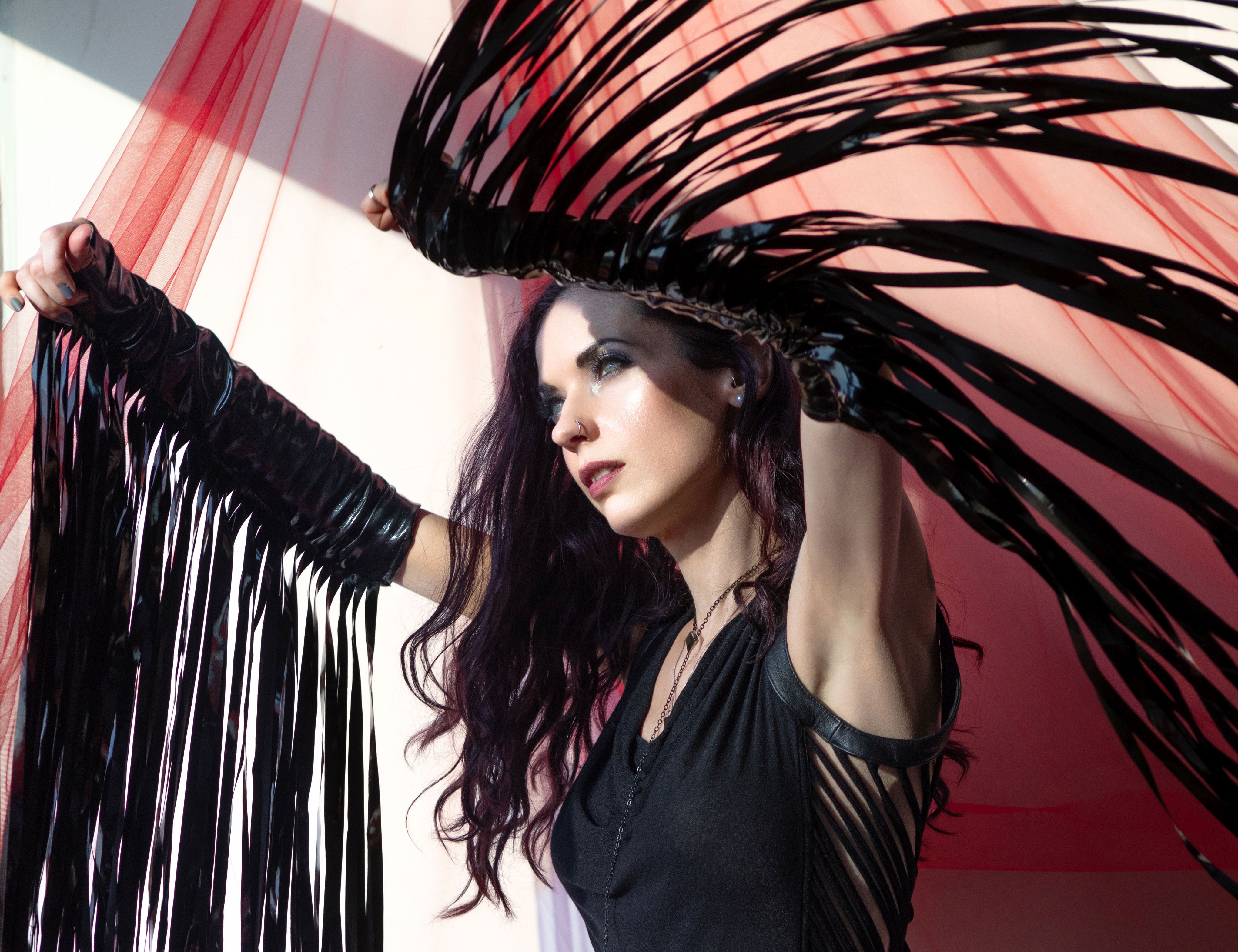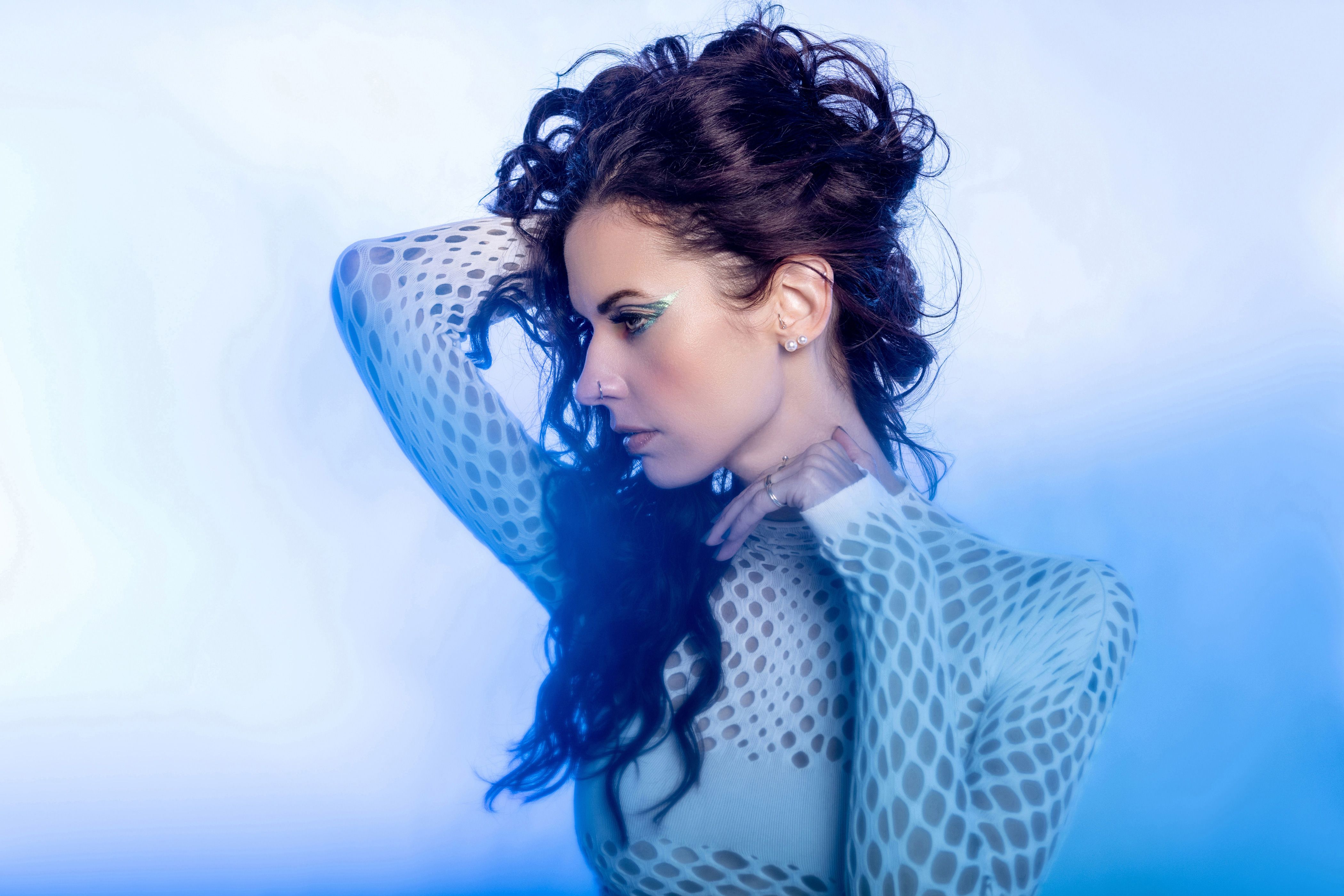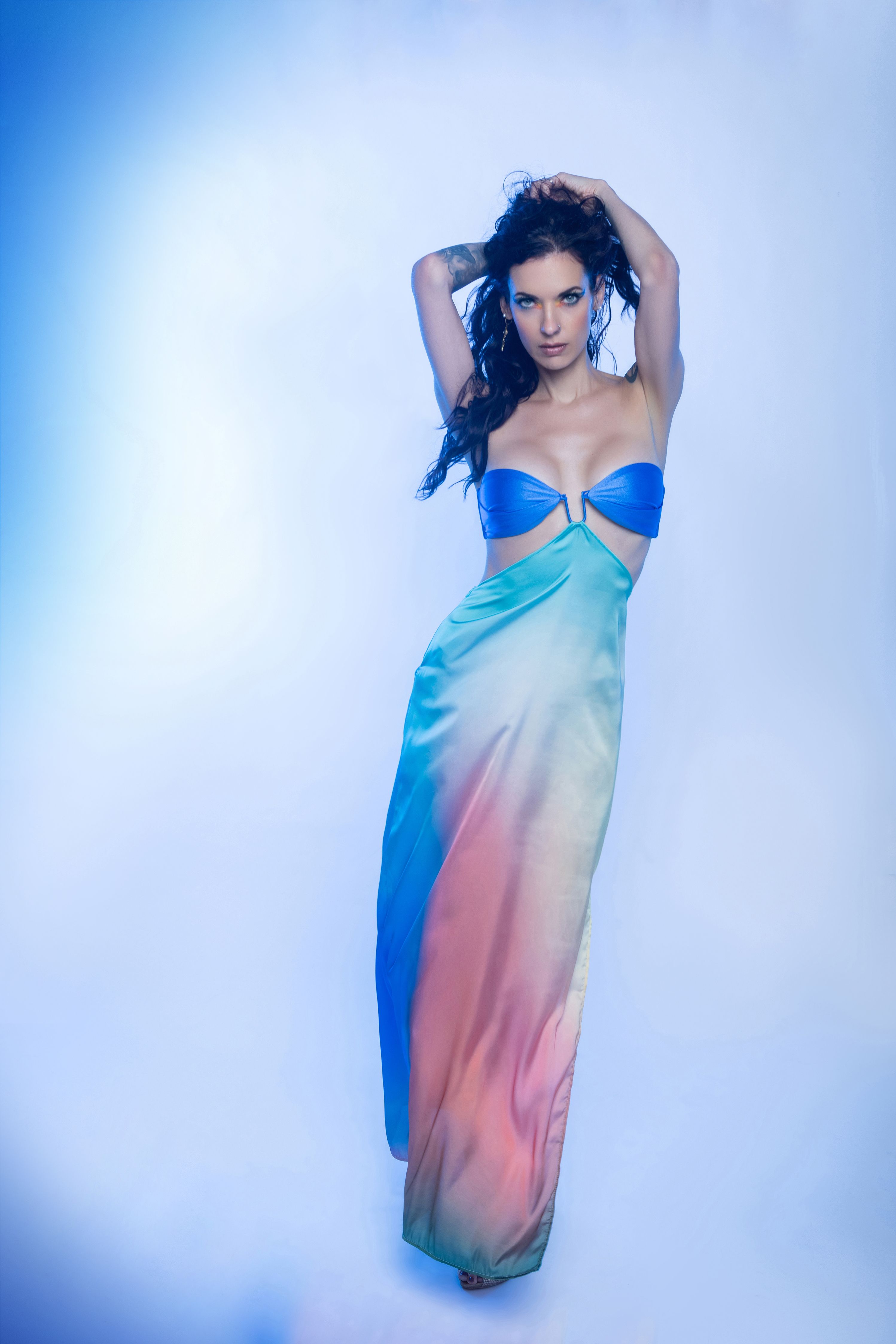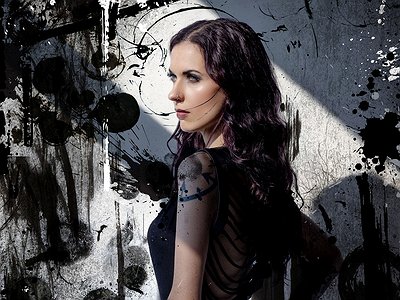Name: Brittany Bindrim
Occupation: Composer, singer, songwriter, producer
Nationality: American
Current release: Brittany Bindrim's Velella Velella, is out March 3rd 2024 via Metropolis.
If you enjoyed this Brittany Bindrim interview and would like to know more about her music, visit her official homepage. She is also on Instagram, Facebook, tiktok, Soundcloud, and Twitter.
Do you think that some of your earliest musical experiences planted a seed for your interest in your voice and singing? How and when did you start singing?
Yes definitely! My family has always been heavily involved in music; it was part of my life from my earliest memories. This certainly influenced and inspired me to become a songwriter.
My dad is a musician and played in bands throughout my childhood. He is a talented singer, multi-instrumentalist, and an incredibly skilled guitar player. My grandmother is a pianist and my sister and I would spend time playing songs with her on her grand piano as kids. My mom is a big music lover and always had music going in my house. My favorite artists that she had playing as a little kid were Prince and Whitney Houston.
As a child I sang and made up silly songs by myself, and I eventually started writing lyrics and songs as a teenager.
If you're also playing other instruments, how does the expressive potential of these compare to your own voice?
As a composer, programmer and songwriter, it’s pretty incredible to have the entire world at your fingertips these days and the potential to program anything you can dream up right from your home studio. But there is something so pure and organic about one’s voice that can’t be reproduced by machines or AI (not yet at least!).
It was an incredibly enlightening and enriching experience to write Velella Velella solo, as I have traditionally written music as a collaborative experience in my band I:Scintilla, or contributing guest vocals on other projects.
Singing is an integral part of all cultures, and traditions. Which of these do you draw from – and why?
Singing is an ancient and fundamental form of cultural expression - the voice presumed to be the original musical instrument. So I think most connect with the voice on a very deep, innate level. Singers can provide different perspectives and insights into another way of life or seeing the world.
The voice is so personal and universal at the same time - it is more human and intimate than any other instrument. I feel like for me songwriting and singing can unlock and convey certain emotions and ideas that are very difficult or impossible to fully express solely through written or spoken word.
As composers and singers we are students of our cultures, traditions and influences, and in the end are building upon the musical lexicon.
What were some of the main challenges in your development as a singer/vocalist? Which practices, exercises, or experiences were most helpful in reaching your goals – were there also “harmful” ones?
When I first started singing publicly as a teenager, I was quite shy. In general I am a pretty introverted person. So I definitely had a period where I needed to get over my stage-fright.
Anxiety and tension are voice-killers; so I had to learn how to control my body and vocal cords, and to relax my muscles on stage. I struggled with this a bit when first starting out and I often found myself singing through the tension in my voice. Over time, I retrained my body’s response to let go during live performances.
Another big challenge for me starting out was my asthma and allergies. I had to go through some trial and error to manage my symptoms and stay healthy through medications, avoiding triggers, exercise, and distance running.
How do you see the relationship between harmony, rhythm and melody? Do you feel that honing your sense of rhythm and groove has an effect on your singing skills?
All three elements working seamlessly are vital to create the overall structure, feel, and emotional impact of a song. To me the rhythm and feel of a song come very naturally and innately. The underlying beat and rhythm come first or are intertwined with the melody.
I rely pretty heavily on my instincts and natural sense of rhythm as a singer and composer, especially when at the early stages of songwriting or while I’m performing on stage. I think this helps me get into the zone and get lost in the music a bit easier during performances.
Brittany Bindrim Interview Image by Emily Gualdoni
What are the things you hear in a voice when listening to a vocalist? What moves you in the voices of other singers?
My favorite singers are usually ones that have very distinct styles and are very expressive, unique, and free; voices that stop you in your tracks and grip your heart.
Some of my personal favorites are Diamanda Galas, Peter Murphy, Elizabeth Fraser, Prince, Chris Cornell, Bjork, and Mark Lanegan.
How would you describe the physical sensation of singing? [Where do you feel the voice, do you have a visual sensation/representation, is there a sense of release or tension etc …]
To me singing should feel free of any tension or hesitation. Your vocal cords and muscles should be warm, open, and relaxed so you feel the sensation of soaring through notes.
What kind of musical settings and situations do you think are ideal for your own voice?
I am very comfortable in the studio. It’s my happy place and I love to be in the throes of the writing and recording process.
But I am always up for a challenge and love to explore new musical landscapes and work with different people.
We have a speaking voice and a singing voice. Do these feel like they are natural extensions of each other, ends on a spectrum or different in kind?
It’s funny since I feel like there are definitely people that have wildly different speaking voices from their singing voices, while others do not. I think this could be because people might develop bad habits in their speaking voices, but while singing we do a lot of things to support and engage your voice in a more natural way. So that could explain those differences.
Generally our cords work by reacting to circumstances when speaking, and alternatively when you sing you learn to allow your vocal cords to lead the process.
Brittany Bindrim Interview Image by Emily Gualdoni
From whispers to screams, from different colours to dynamics, what are the potentials and limits of your voice? How much of your vocal performance can and do you want to control?
Some of my favorite singers have an edge, roughness, or raspiness to their voices - which is very different from my natural vocal style. You always want what you don’t have, right?!
I had to come to terms with the fact that I’m not going to be able to pull off super aggressive vocal styles. My natural voice is more dynamic and feminine. Writing Velella Velella helped me get in touch with new potentials of my voice as well as understand my limits as a singer.
For example in my single ‘Obelisk', I sang the verses in a higher, pleading style that I haven't fully explored before on any of my other previous recordings. I felt like that vocal treatment provided a good counterpoint to the heavy, marching movement in the music.
When you're writing song lyrics, do you sense or see a connection between your voice and the text? Does it need to feel and sound “good” or “right” to sing certain words? What's your perspective in this regard of singing someone else's songs versus your own?
Yes I definitely need to feel a symbiosis between the vocal and lyrics. The words and melodies should feel cohesive and natural.
I tend to write lyrics and melodies in different ways depending on the song. Sometimes the vocal melody comes first and I write the lyrics to it, other times the lyrics come first and then the vocal is inspired by the words. I tend to let things flow very organically.
When performing a cover, I try to honor the integrity of the song while still making it my own.
Strain is a particularly serious issue for many vocalists. How do you take care of your voice? Are the recipes or techniques to get a damaged voice back in shape?
Vocal strain is indeed an issue any vocalist must tackle. The best way to avoid strain and fatigue in my experience is to warm up your vocal cords and learn proper breathing techniques and habits that will make sure you are relaxed and free of tension.
This requires some practice and having some tricks up your sleeve like vocal and breathing exercises. Lip trills, humming, sirens and slides I’ve found to be very helpful. Also, it’s vital to be hydrated and as well rested as possible. 
Brittany Bindrim Interview Image by Emily Gualdoni
How has technology, such as autotune or effect processing, impacted singing? Has it been a concrete influence on your own approach?
The rise of advanced effects have not affected my vocal approach much per se. But after vocals are tracked, it is really fun to play around with distortion, delay and reverb that suits the mood of the song.
On the flip side though, instead of trying to use effects to enhance a vocal in an artistic way, I have noticed in pop music a lot of vocalists sound very similar because the same treatment and effects have been applied to the vocals.
Additionally, the rise of the use of autotune may sort of feel like cheating to singers that rarely (if ever) rely on it, but nothing can compare to a well executed, raw, pure, recorded performance!
For recording engineers, the human voice remains a tricky element to capture. What, from your perspective, makes voices sound great on record and in a live setting?
As a singer there are things you can do to make sure that you sound your best and have fun when heading into the studio and on stage.
One is to be prepared. Memorize your lyrics, songs, the timing and changes - that way you can lose yourself in the moment and focus on your performance. Also working out the harmonies in advance can be a time saver in the vocal booth.
For both recording and live performances, developing good mic technique, taking care of your voice and warming up are key to reaching your full vocal potential.
Motherese may have been the origin of music, and singing is possibly the earliest form of musical expression, and culture in general. How connected is the human voice to your own sense of wellbeing, your creativity, and society as a whole?
I feel like I have really discovered who I am as an artist through exploring my voice and by learning from my musical influences and predecessors who have paved the way.
To this day our voices are often how we communicate, impart ideas and knowledge, build relationships, drive social movements, pass on cultural heritage and share human perspectives.
I've been fascinated by pure vocal recordings for a long time. Do you have some recommendations in this direction?
I think finding a microphone that best captures your voice is important to recording pure, isolated vocals.
It’s helpful to test out different mics and find the one that suits you.







